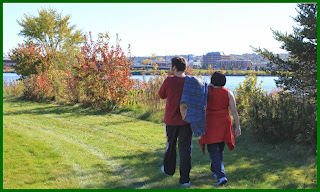I have been trying to read, and understand, literature about autism disorders since my son was diagnosed with an autism disorder almost 16 years ago. (Many would undoubtedly suggest I have far to go in development of that understanding).
In the last few years I have begun to try and read and learn more about epilepsy and seizures, largely because of my son's apparent seizure activity confirmed by two classic grand mal seizures in the past 15 months. An article on recent Companion of the Order of Australia recipients, recognizing accomplishments in their fields of a number of Australians included the recognition of Melbourne-based Professor Samuel Berkovic who, with a team of scientists, "discovered the first of the epilepsy genes back in 1995. Since then, they have found a number of other genes linked to epilepsy."
In reading this article I was struck by the expression "genes LINKED to epilepsy" an expression often used to describe the results of autism disorders research results: "genes LINKED to autism" rather than discovery of genes known to CAUSE autism. I sometimes suspected that autism researchers, who overwhelmingly conduct genetic based autism research, with very little serious research of possible environmental factors that might be involved with causing or triggering autism disorders, were simply moving the goalposts after failing to find direct causes or triggers of autism disorders. I have never doubted that genetics play an important role in causing autism. My concern was with the apparent exclusion of the obviously more difficult to conduct environmental based research.
Since my son's seizure activities became very obvious I have become aware that some research indicates that seizures are frequently reported in persons with autism disorders as referenced in this abstract from a 1995 study by Rossi et al at the University of Bologna: EEG features and epilepsy in patients with autism:
"Epileptic seizures are frequently reported (4–32%) in autism. These values are higher than in the normal population of children and adolescents (0.5%). In the literature there is no uniform description of epilepsy in autism. We examined 106 patients with autistic disorder divided into three groups on the basis of presence or absence of EEG paroxysmal abnormalities (PA) and/or epilepsy including febrile convulsions (FC). Our patients presented an autistic syndrome unrelated to clear congenital or acquired encephalopathy. The prevalence of epilepsy and EEG PA was 23.6% and 18.9%, respectively. Significant differences between the three groups appeared for (i) familial antecedents for epilepsy/FC and neurologic and psychiatric diseases (P < 0.004), (ii) a different proportion between the three groups for mental retardation (P < 0.03), (iii) and EEG fast activity (P < 0.04). Our patients showed several types of epilepsy, including idiopathic forms with seizure onset after the age of 10 in 45% of cases. Seizures were mainly partial, not frequent and controllable by anti-epileptic drugs. PA were mostly focal and multifocal and in 45% of cases were typical of benign childhood partial epilepsy with centro-temporal spikes. The higher incidence of epilepsy and EEG PA is apparently not related to organic pre-, peri- and postnatal antecedents or cerebral lesions. On the contrary, genetic factors responsible for autism and epilepsy seem important in the genesis of these two disorders."
As a humble father of a son with an autism disorder, intellectual disability and seizure activities I am curious as to whether the genes that to date have been "linked to autism disorders" have been compared with those "linked to epilepsy"? I am not by any means pretending to have any competentcy in analyzing such information myself and I have no agenda in asking the question other than the curiosity of a father whose son suffers from autism and epilepsy symptoms. If the same genes are "linked" to both disorders does that not help in understanding the origins and causes, perhaps the nature, of both epilepsy and autism disorders? If there are genes linked to both autism and epilepsy are they also linked to intellectual disability? If anyone who happens on this blog can provide answers or information responsive to these questions it would be appreciated.























3 comments:
You say, "It (bureaucracy) delays, it denies that problems exist, it worries about the careers of its members...." So very true.
Let me add that certain senior members of this bureaucracy, in certain field, routinely lie, deceive and mislead to get their way. Public welfare is least of their concern. We pay extremely heavily for such bureaucrats both in monetary terms and extraordinary damage they cause to public and society. Such tragedy continues with the change of government. The new governments and political bosses; because they are new; are prevailed over and such bureaucrats manage to pull wool over their eyes and nothing changes. That is the failing of our democratic system.
I hope and pray that additional innocent young lives and their parents are not subjected to such excruciating pain and suffering which has been and is being inflicted currently on some.
You say, "It (bureaucracy) delays, it denies that problems exist, it worries about the careers of its members...." So very true.
Let me add that certain senior members of this bureaucracy, in certain field, routinely lie, deceive and mislead to get their way. Public welfare is least of their concern. We pay extremely heavily for such bureaucrats both in monetary terms and extraordinary damage they cause to public and society. Such tragedy continues with the change of government. The new governments and political bosses; because they are new; are prevailed over and such bureaucrats manage to pull wool over their eyes and nothing changes. That is the failing of our democratic system.
I hope and pray that additional innocent young lives and their parents are not subjected to such excruciating pain and suffering which has been and is being inflicted currently on some.
At the same time, in the first case you sited, it seems particularly ironic that an autistic child is placed in the equivalent of 'isolation' - no contact with the inmates/ people etc. It seems the very worst of possibilities.
Best wishes
Links to this post